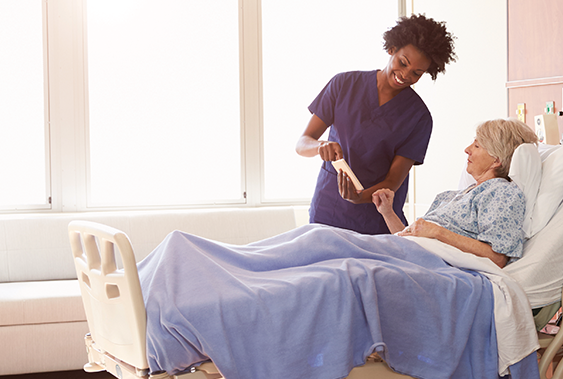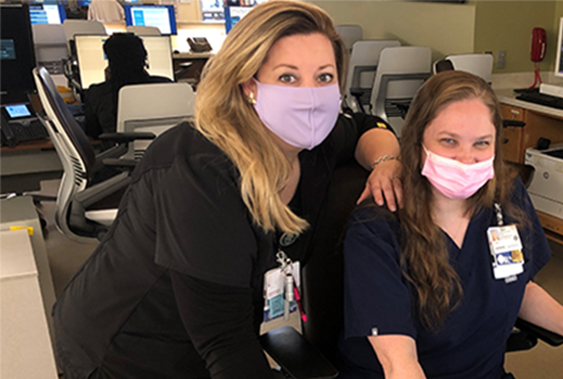Special delivery. Patient education easily available in MyChart.
Houston Methodist is making it easier for our patients to get the education and answers they need about their care, when they need it, whether they’re in our hospitals or at home.
Through a first-of-its-kind integration with Epic, patients can now sign into MyChart to receive educational material from an expansive library. This ease of access to information promotes improved awareness, which enables better long-term recovery.
”With enhanced educational resources, we are assisting our patients to be more informed and better prepared to care for their health care needs,” said Janet Leatherwood, HMSL chief nursing officer. “The more information we can make available, and the easier we can make it for patients to digest that information, the better their long-term prognosis for recovery.”

MyChart. Making it easier.
In 2019, we began the journey to simplify delivery of patient education in Epic as part of the electronic and/or printed After Visit Summary or discharge statement. This included links to view videos and medical and prescription drug fact sheets. Now, those same resources are even easier for patients to find as standalone education resources in MyChart, including direct links to articles and videos they can easily access when they need them.

“We’re providing information about your procedure, your disease process, your medications,” Leatherwood said. “Patients can look at it again and again if they choose. The information is there to help you if you need more information.”
Jerrold Alwais, a recent patient at HMSL, underscores the value of access to information following a recent procedure.
“The doctors and nurses did a good job explaining things to me, but in the heat of the moment it was a lot to digest,” said Alwais. “While I was waiting for surgery, I watched the video they assigned to me in MyChart and read the articles about what to expect with recovery. I was able to take my time and really understand what was about to happen to me. This helped me ask my care team better questions and feel more comfortable about the surgery.”
The assigned educational material remains available after discharge as well, so patients can look back even weeks later as circumstances change, and new questions arise. Additionally, family members and caregivers with shared proxy access can view these same resources for awareness and to support patient care when their loved one is not in Houston Methodist’s care.
“If the patient and family don’t understand the discharge information, they may have limited resources to get clarity,” she said. “This education library eliminates the need for patients to remember what they heard or find a piece of paper with instructions.
Now, it’s all in MyChart.

Personalized for patients – a click away for the care team.
With over 8,000 resources, the patient education library includes articles and videos covering topics like clinical procedure overviews, discharge instructions, medication fact sheets and lab test descriptions.
Clinicians simply click the FHIR Education tab under the patient’s chart in Epic and the system automatically suggests health topics for clinicians to assign to patients, based on diagnoses, treatment and any other health conditions, including chronic conditions like asthma, diabetes or obesity.
“Educating patients is part of our job as nurses,” said Katie Broadway, NICU professional practice leader at HMH. “This system is pretty simple. And as the first DNV-certified Comprehensive Stroke Center in the country, we want to deliver consistent, quality patient education. Now everyone on the unit has the same, favorited materials, which we can personalize for each patient.”
“When patients come in following a stroke, they often ask ‘why me?’” said Kimberly Randle, RN in the WT 11 Neuro ICU. “And with FHIR Education, we can share risk factor materials that we customize to show similarities in age, gender, ethnicity or lifestyle habits. Making the materials personal to them, or their loved ones, can be super valuable for them. When this information is less complex and more appropriate to their needs – it impacts their ability to absorb it all too.”

Education. Driving recovery, reducing readmissions.
With a computer or smartphone, patients receive the tailored materials in MyChart, wherever they may be. With this enhanced education, they’re able to ask questions and discuss any concerns with their care team.
“Having clear, readily available patient education resources may decrease complications and rehospitalizations,” Leatherwood said.
This patient education is more than simply providing information. In fact, it can significantly impact long-term health. Patients receive detailed information about at-home care, including prescription medication fact sheets, instructions for managing pain, wound care and exercises to help them resume normal daily activities.
“I’m home now and the road to recovery is going great,” Alwais said proudly. “Fortunately, I can look back at the information in MyChart to help this process along. I understand what these new medications do and the steps I can take to eat healthier or care for myself. It’s all a part of my efforts to make the right choices and improve my health.”
